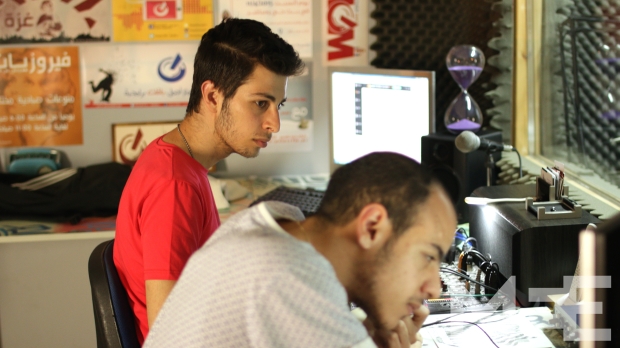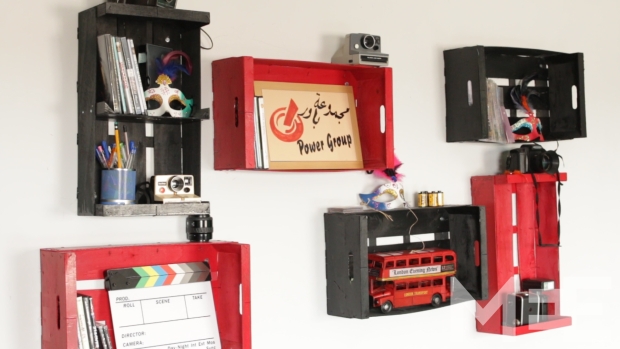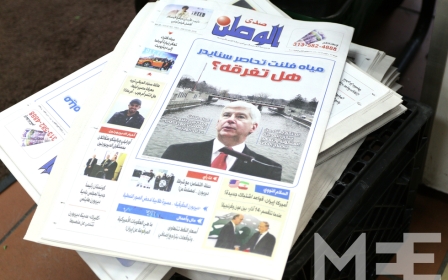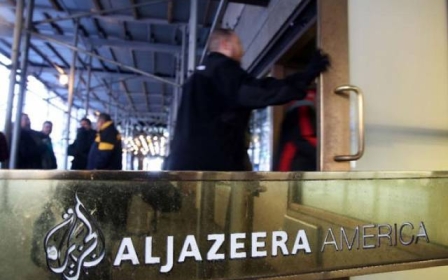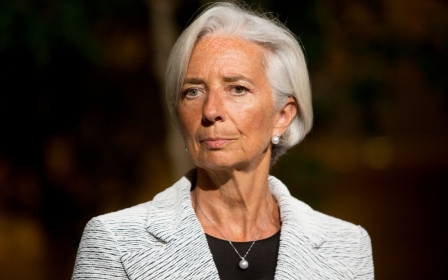Bethlehem's youth radio station powers forward despite setbacks
BEIT JALA, Occupied West Bank - It is just before 7:30pm and Power Radio, Bethlehem’s only youth-run radio station, is about to go live with an online broadcast.
Around a dozen young Palestinian men and women have gathered at Power Group’s office in Beit Jala, northwest of Bethlehem, and the vibe is electric. Seven or eight college-aged youth are crammed into a small kitchen sitting area, some lounging and drinking tea, others clapping and singing along to the music playing over the speakers.
“Every day we have one programme going live,” 21-year-old sound engineer and unofficial Power leader Sliman Mukarker tells Middle East Eye. “We do radio shows discussing youth issues - things that youth want to talk about.”
With youth unemployment in the West Bank soaring at around 40 percent and little in the way of creative-sector jobs, Power was established with an entrepreneurial spirit in 2012 in hopes of providing an avenue for youth to use media production to express themselves on their own terms. More than just an online radio station, Power Group’s members collaborate to make original films, produce TV shows and organise monthly volunteer projects.
Tonight, the atmosphere at Power is more like that of a youth hostel than an office space. Outside the kitchen area, two energetic members of the group are dancing to the beat of the music while another plays with the cat that has made the Power office his home.
In the studio down the hall, things are a bit more hectic. Minutes before the start of the radio show, one of the two computers connected to the station’s database has stopped working.
“I swear this is the first time this has happened,” Mukarker says, as he and another young man unscrew the computer casing as if popping open the hood of a car. After replacing the power supply, the computer seems to be up and running.
But after five minutes, it crashes again.
The young media gurus briefly debate whether or not to air a rerun instead of a new broadcast, but soon they decide the show must go on. Though they will have to improvise a bit, they go ahead with the programme using only one computer.
Shortly after 8pm, Power Radio goes live. Tonight's show, called Ya Saatir (Dear Protector), focuses on unusual news stories from around the world.
‘A real shock for the group’
Underneath the happy-go-lucky feel at Power is a deep sense of determination shared by its members. After the group’s founder and visionary, Nabil Hamouz, committed suicide in 2014, the young Palestinians have pledged to work tirelessly to make his dream a reality.
Hamouz was young man from Fawwar refugee camp in the southern West Bank city of Hebron. In hopes of finding an outlet for his creativity and production skills, he brought together a number of his university classmates to start a media group created by Palestinian youth, for Palestinian youth. With no funding and without much equipment, a few students began meeting in Hamouz’s basement, from which they would eventually broadcast their first online radio programmes.
“We thought, ‘we can start a group - we as youth, we can help each other,’” Mukarker told MEE. “Like, I know more about sound, Nabil knows more about editing, someone else knows more about photography.”
Despite the challenges the group faced - no financial support, little professional experience, not to mention the daily struggle of living and working under Israeli occupation - Hamouz was known as an eternal optimist, always encouraging his cohorts in their work.
“Whenever I filmed anything or made anything, Nabil really encouraged me," Power videographer Shayma Awawda told MEE. "He told me, ‘Yes, very good! Keep going. Very good! You should keep adding more'."
“Because he was a person who gave you positive energy so you could remain hopeful that you would become something in life,” she added.
For two years, the group was steadily progressing, and they were excitedly working to expand Power further as they finished their university studies. But then the unthinkable happened.
“Suddenly - no one knows why - Nabil decided to end his life on 28 July, 2014. It was a real shock for the group,” Mukarker told MEE.
“It was very difficult for us to start again, especially at that time when we still didn’t accept or understand why Nabil was gone, why he’s not here.”
The dream continues
After Hamouz’s death, members of Power came together to decide what to do next. Determined to bring about the kind of project he had worked so hard to create, the young Palestinians decided to take things to the next level and rent an office space.
Ritta Kamel, Power’s director of programming, told MEE that this transition period was the greatest challenge Power has faced thus far.
“It was a bit difficult, but we were able to get back together as one team and find a place, start over and build ourselves up and get the new place ready,” she said.
“It took a little less than a year to the point where we had finished everything. But looking back where we are now, we have accomplished a lot of things. We have accomplished something really big.”
Power has indeed been busy throughout the past year.
In 2015, they produced a comedy series called Shoofaat for the al-Falstiniah TV channel.
“It was our first time filming a TV show or anything like that,” Awawda told MEE. “It was a great experience for us to all be together all day, trying different things - one time it works, another time it doesn’t, here the filming is good, here it’s not.”
That same year, Power Radio had a partnership with another Bethlehem radio station and broadcast their content on the FM airwaves for the first time.
“It became more stressful because now there were more people listening to us,” Kamel said. “But it was a really good experience, getting in a car and hearing yourself in the car, or from your house, from anywhere.”
And this week, Power is in charge of video and audio production at Bethlehem’s Yalla Yalla (C'mon C'mon) Children and Youth Theatre Festival.
Mukarker has also been putting the finishing touches on a documentary film about the story of Power and their beloved founder. The film has been accepted at Abu Dhabi’s Zayed University Middle East Film Festival, to be held in May 2016.
“We believe that Power can make a real change in the community,” Mukarker told MEE. “And we do it for us, for the youth and for Nabil.”
For members of Power, it is crucial for young, creative Palestinians to have opportunities to use their skills to express themselves here in their own country.
“There were a lot of young people who thought of emigrating, going abroad,” Kamel told MEE.
“But through our radio programmes we discussed emigration and unemployment - that there is no work here and no opportunities - and we found that there is a large group of people that would like to stay here and do things here.”
“We hope that Power gets bigger and is able to bring together a larger number of people, so they can stay here and not leave the country. Because this is the thing that they want - people outside and the Israeli occupation - for us to leave. So we’ll keep holding onto Palestine and do something here.”
This is especially important to Power given that their founder experienced the same kind of frustration as so many of his peers before he died.
“We don’t want anyone to reach the stage [of frustration that Nabil reached],” Mukarker said, adding that it was caused by “a combination of all the bad things that we are living - being under occupation with no job and not much to do”.
“I think [it’s easy to be frustrated] because maybe you’re trying to do more, but the reality that you are under occupation stops you [from doing] a lot of things. And you feel like you’re failing one time, and another time, which is really frustrating,” he said.
"But Nabil was a very creative guy, and as you can see he gathered 13 people together to start something, and it’s his dream.”
New MEE newsletter: Jerusalem Dispatch
Sign up to get the latest insights and analysis on Israel-Palestine, alongside Turkey Unpacked and other MEE newsletters
Middle East Eye delivers independent and unrivalled coverage and analysis of the Middle East, North Africa and beyond. To learn more about republishing this content and the associated fees, please fill out this form. More about MEE can be found here.




